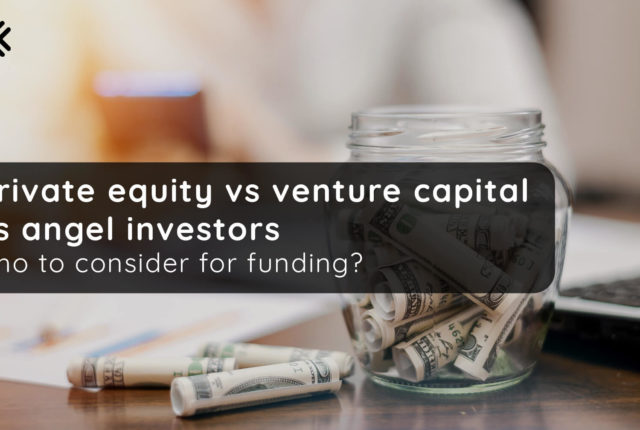
Angel Investors vs Venture Capital: Where should I secure Funding?
Many times you would have come across different terms such as Angel Investors, Venture Capital, Crowdfunding, and Equity Funding. These terms are commonly used for startup funding. Depending on the source of funding, it is very easy for an entrepreneur to get confused.
In this article, we want to clarify all the terms to simplify the whole process of funding. So the common question asked by any entrepreneur would be “Angel Investors vs Venture Capital: Where Should I secure Funding?”
The most common question asked by any entrepreneur would be “Angel Investors vs Venture Capital: Where Should I secure Funding?”
Both Angel investors and Venture Capitalists are present in the funding business and for any entrepreneur, the difference between the two has to be crystal clear.
However, before seeing the difference between angel investors and venture capitalists, we have to first critically analyze the terms one by one.
Angel Investors (Angels)
For you to choose between “Angel Investors vs Venture Capital”, we have to first understand the way in which Angel Investors function. An Angel investor is also known as an Angel, who is typically a high net worth individual, who invests his own money in a budding business. Such an investor would invest some proportion of the money in the exchange of a certain proportion of equity stake in the business. These individuals maintain a low profile and usually operate within the closed sector. They may carry out funding for your business on their own or through a syndicate.
Many entrepreneurs who do not consider going for angel investment, would depend on bootstrapping or funds from family and friends. However, with the current changes, all start-ups prefer some mode of funding. When it comes to funding, an angel investor would be capable of investing several hundred thousand dollars as a part of an active syndicate.
Of course, there is a high amount of risk taken by the angel investor. The capital provided by an angel investor is normally known as risk capital. As the company is in its inception stage, there are several risks. Such risks would involve, new market entry, customer satisfaction, and business traction. There is no probable evidence to answer all these questions. When an angel investor contributes investment to the start-up, there would be many things in his mind. Plus added to this, is the business uncertainty. Hence, in return, the angel investor wants a large percentage of equity in the start-up. Along with this, the investor would want to take part in the management of the company.
This is an added advantage for the business, as there is a mentor on board with sufficient exposure. However, the equity stake taken by an angel investor would be relatively equal to that of the stake taken by a venture capitalist. From this, an entrepreneur would reconsider who to choose between Angel Investors vs Venture Capital.
However, if your business is successful at securing the first round of funding from an angel investor, then he would be more than willing to invest in your business during successive funding rounds.
Now that we know about an angel investor, we move on to understand who is a venture capitalist.
Venture Capitalist (VC)
When deciding between Angel Investors vs Venture Capital, an entrepreneur would have different forms of mixed emotions. First and foremost, the probability of securing the funding from the preferred investor. Many times, there are entrepreneurs who secure funding from investors who don’t have experience in the same domain where they are investing.
Apart from this, the product and business plan must be viable to secure an investment. Hence there are many thoughts which an entrepreneur would consider before going ahead with funding. When it comes to Venture Capitalists, they tend to invest in large companies and start-ups which have a steady growth rate. Venture Capitalists are usually large companies that do not depend on their own funds as a source of investment.
A venture capitalist would usually have a fund that is dedicated to investment in large companies and start-ups. Venture Capitalists only invest in businesses that have a large potential for growth. There are several criteria that are considered by a typical venture capitalist before they consider investing.
An entrepreneur or a business that has proved its concept in the market and has a sufficient number of consumers would be the preferred business as an investment option by the venture capitalist. The amount funded by a typical venture capitalist would be about USD 1 Million. This would only be the capital that is provided during the first round of funding.
Over a period of time, these rounds of funding have got their own names such as Series A, Series B, and Series C funding. Many times you would have heard in the news about successive series funding. This is none other than venture capitalist funding.
The amount of risk taken by a Venture capitalist is considerably less when compared to an angel investor. As the business has scaled in the market and has a considerable number of consumers, a venture capitalist is not overwhelmed with uncertainty. However, there is no business without any risk.
Due to this, there are various venture capitalist firms that take part in the management of the business. For their investment in the business, in return, they would want a certain equity percentage. The amount of equity percentage would be approximately between 20 to 30%.
At the end of everything, if you successively convince a VC to fund your business, then they may be interested in further funding. Hence convincing the venture capitalist to fund your business, maybe your best bet.
Now that we analyzed the meaning of Angel Investors v Venture Capital, we have to understand their main differences. Based on the differences, we provide which option to go ahead with for funding your business.
Difference between Angel Investors and Venture Capitalists
Any entrepreneur would think, who to choose for funding. When understanding whether to consider between Angel Investors vs Venture Capital, then there are a lot of questions that can be raised. Below we have provided the key differences based on several factors. Though there are differences between angel investors and venture capitalists, there are few similarities between them. The differences provided below would provide you with a clear understanding.
Source of Funds
Angel investors would usually invest their own funds which they have earned out of successive investment rounds. Usually, an angel investor is an individual or a group of individuals that form a syndicate for investing in start-ups. Such individuals would also choose to participate in running the business.
On the other hand, Venture Capitalists comprise companies that have a fund mainly for investing in Startups. However, VCs would only be investing in Startups that have sufficient traction and market reputation.
Amount of Investment
An angel investor would be providing several thousand’s for the start-up. Usually, this amount would be below USD 1 Million. In comparison, a typical venture capitalist would provide USD 1 Million for Series A funding. During the second funding round, the amount contributed can be between USD 5 Million to 10 Million. However, there are Venture Capitalists who provide even several hundred million dollars during a Series C funding.
Though the amount of investment made by an angel investor is less it is provided faster than a venture capitalist. Usually, VCs take time in deciding whether or not to invest in your start-up.
Type of Business
Another difference between angel investors and venture capitalists is the type of business they invest in. Angels are individuals or groups of individuals that invest in early-stage start-ups which have minimum capital and fewer resources. Hence the main businesses targeted by angel investors would be early-stage startups that require only growth capital as an initial form of investment.
Venture Capitalists mainly target highly innovative startups that have surpassed the growth phase. They mostly avoid funding start-ups that are present in their seed stage of funding.
Decision Time
Angel investors take lesser time in making their decision to invest in a start-up. Whereas, venture capital firms take some time before providing the term sheet.
Risk Involved
There is a high risk involved when an angel investor is investing. The capital provided by an angel investor is normally known as risk capital. As the company is in its inception stage, there are several risks. Such risks would involve, new market entry, customer satisfaction, and business traction.
In comparison to angel investors, the risk involved in a VC is less, as they prefer and target large start-ups which have a dominant presence in the market.
Equity Ownership
In terms of equity ownership, an angel investor would want about 25 to 30% of the equity stake in the company. As there is a high amount of risk involved when investing in an early-stage start-up.
In comparison, the equity ownership of a VC is similar to an angel investor. However, the risk involved is comparatively less.
Management/ Decision Making
An angel investor mostly wants to take part in the active decision-making of the company. Apart from having an equity stake, they want to actively be involved in the managing of the company. However, angel investors do not have the authority to remove the management.
Venture Capitalists always want to be a part of the board. They have the power to remove other management or take over the business if the company performs badly over a period of time.
Take Away- Angel Investors vs Venture Capital
Now that we have provided the guide, it is your decision to choose. Whatever you go ahead with, first weigh the pros and cons of your funding options. When comparing Angel Investors vs Venture Capital, we can see that there are many differences and similarities.
From the difference between Angel Investors vs Venture Capital, it is understood that an early start-up entrepreneur would prefer angel investors, as securing the investment is easy. Well-established start-ups would prefer VC as a way of funding.
Going ahead it is important for you to understand the requirements of your business before securing funding.
Author
arunRelated posts
Tips for Completing your First Funding Round
Funding process forms the initial stages of your entrepreneurial journey. It loo
A Guide to Seed Fundraising
What is it? When, How Much to Raise?
Private Equity vs Venture Capital vs Angel Investors- Who to consider for funding?
Funding would be required for every entrepreneur irrespective of the stage of bu






Leave a Reply